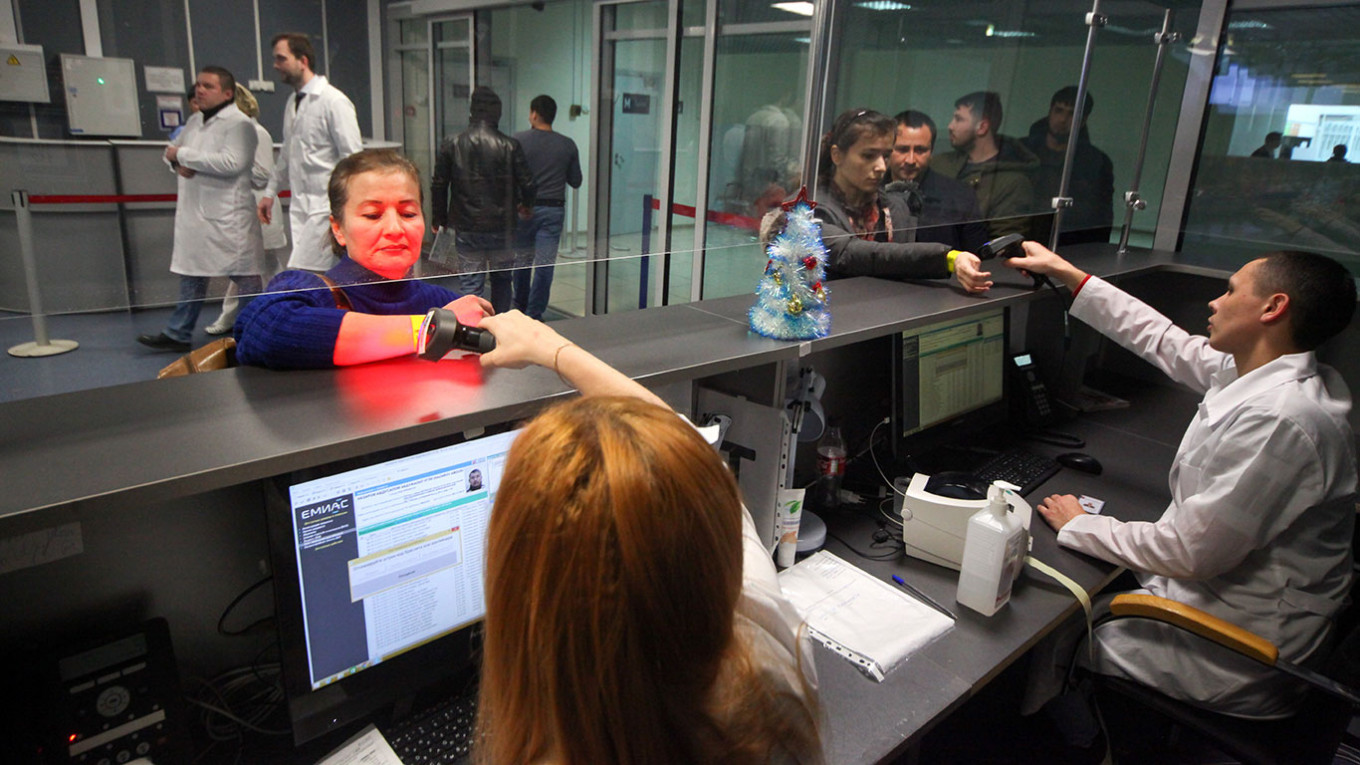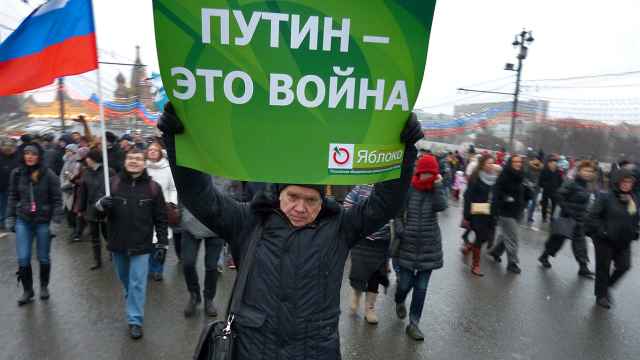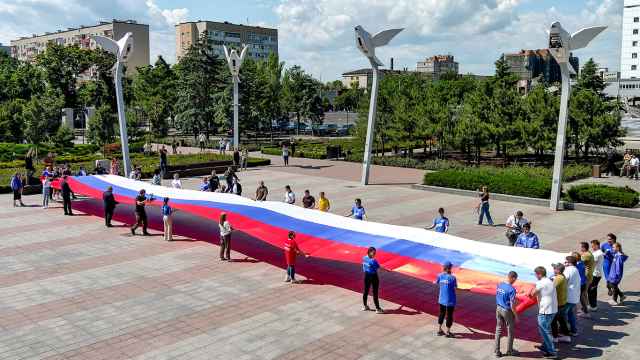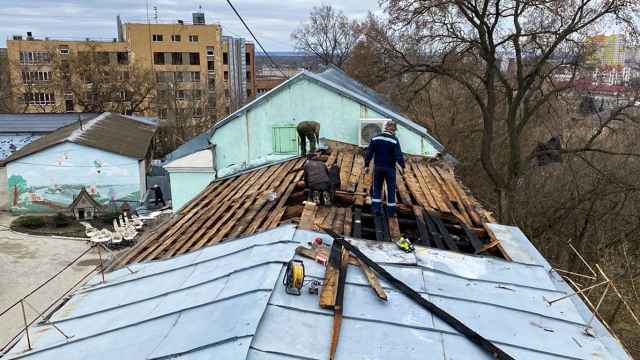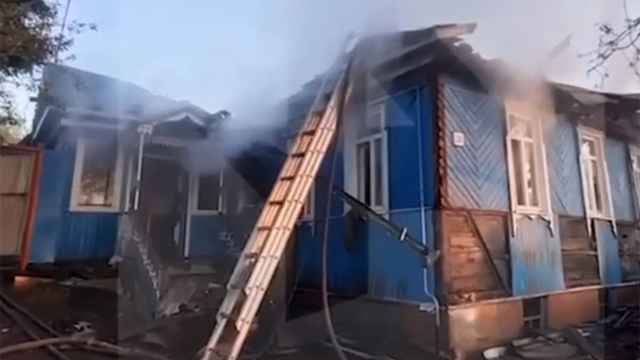European businesses are on a last-minute lobbying drive in a bid to change a “drastic” new law that would require foreign employees based in Russia to undergo extensive quarterly medical checks, warning it could trigger an “exodus” of staff and investors.
The new law takes effect at the end of December and would require foreign workers in Russia to be tested for tuberculosis, the coronavirus, sexually-transmitted diseases, including HIV/AIDS, as well as drugs and other psychoactive substances every three months.
Business associations say they have been fielding “countless calls and emails” from concerned members about the new rules following the publication of the government’s official guidance on how the law will be interpreted, and a Bloomberg report that triggered alarm among investors.
“We’re even getting calls from board members from parent companies in Germany asking whether Russia is sending a political signal here that foreign companies are generally no longer welcome in the country, or whether this is simply a poorly drafted bill,” said Matthias Schepp, chairman of the German-Russian Chamber of Commerce, which represents more than 1,000 German companies with operations in Russia.
The law comes from the Health Ministry and was passed in the summer, but guidance outlining the requirement for quarterly medical checks was only included in an official decree published November.
Some 10 business associations, including the Association of European Businesses and the American Chamber of Commerce, wrote to First Deputy Prime Minister Andrey Belousov and Deputy Prime Minister Tatiana Golikova earlier this week demanding the law be watered down.
“It has been a long time since any legislative act has caused such a wave of misunderstanding, disappointment and indignation among thousands of foreign senior and middle managers,” said the letter, a copy of which The Moscow Times obtained.
“These changes will significantly complicate the process of attracting foreign investments to Russia.”
The government is understood to have not yet responded, but people familiar with the matter say Russia’s Economy Ministry — which is tasked with boosting investment, innovation and economic growth — is aware of the concerns.
The business groups, led by the German-Russian Chamber of Commerce, say they are now in close contact with the Economy Ministry to try to implement some changes to the law before it comes into effect in two weeks.
These include excluding “Highly Qualified Specialists” — a special visa category designed to make it more attractive and easier for firms to bring highly paid foreign employees into Russia — from the requirements, and making the medical checks annual instead of quarterly.
“We’re hoping that we can get at least some exemptions, or something which could make this law less drastic,” said Thorsten Gutmann, a spokesperson for the German-Russian Chamber of Commerce.
Though European businesses are voicing their concerns loudest in public, Russian business associations are also believed to be perturbed by the new laws, as the country’s largest agriculture and construction firms rely on millions of labor migrants from Central Asia.
Amid a demographic crisis and record-low unemployment, Russian firms are desperate for an influx of new workers. Only an estimated one in three of the migrants who returned home at the beginning of the pandemic have since come back to Russia.
But as the government comes under pressure over its handling of the coronavirus crisis, big politicians have made increasingly anti-immigration statements in recent weeks. Moscow Mayor Sergei Sobyanin, for instance, called on the city to reduce the use of migrant workers in the capital’s large-scale housing renovation project.
At the same time, Moscow officials have also recently pointed to a shortfall of around 200,000 construction workers in the capital and called for entry requirements for labor migrants to be relaxed.
‘Not acceptable’
Of particular concern to foreign workers in Russia is the law’s requirement that all family members — including children six and over — undergo the health checks.
“There are business managers of large and medium-sized companies who are thinking of leaving Russia because they say they don’t want to have to subject their children and other family members to these kinds of regular medical checks,” Gutmann said.
“There is a lack of understanding as to why these new rules have been introduced,” said Alf Torrents, head of the Russo-British Chamber of Commerce. He said foreign workers in Russia are not intrinsically opposed to health checks, which are a requirement for a work permit in many countries, but added that there is “disquiet over the frequency” which will place a heavy burden on staff members.
“I did my medical checks on Monday, and although the system was very efficient and everybody very professional, the process still took half a day,” Torrents said. “This does not include the trip to the migration center to submit the documents which will take another half a day at least. In the best case scenario, this will cost every individual at least four days a year which could be spent working.”
Another issue is the inclusion of Covid-19 on the list of tests, implying that a positive test for the coronavirus could prevent a foreigner from obtaining a work permit. That could cause issues if they then have to wait some weeks before they can test negative, potentially missing the strict time requirements to submit documents.
Others say the already-stretched migration center, located a two-hour-drive south of Moscow, will be unable to process all the extra submissions.
“It’s not acceptable to have to go through that every three months from now on,” said one German business manager, who asked to remain anonymous and had just recently completed the checks and submitted the documents.
“I don’t want to have a chest x-ray every three months. I better start looking for another job in Germany now — and I know a lot of other foreign specialists are thinking the same.”
Business associations say something will have to change in the weeks before the law comes into force, given that a number of key areas — such as whether it applies to people with temporary or permanent residency — are still open to interpretation.
But for many, it is the latest in a years-long cooling of Russia’s attitude and openness toward foreign businesses.
“If this law stays unchanged it will be massive. Some businesses are thinking about withdrawing completely from Russia. It really could cause some kind of exodus of foreign investment,” said Gutmann.
A Message from The Moscow Times:
Dear readers,
We are facing unprecedented challenges. Russia's Prosecutor General's Office has designated The Moscow Times as an "undesirable" organization, criminalizing our work and putting our staff at risk of prosecution. This follows our earlier unjust labeling as a "foreign agent."
These actions are direct attempts to silence independent journalism in Russia. The authorities claim our work "discredits the decisions of the Russian leadership." We see things differently: we strive to provide accurate, unbiased reporting on Russia.
We, the journalists of The Moscow Times, refuse to be silenced. But to continue our work, we need your help.
Your support, no matter how small, makes a world of difference. If you can, please support us monthly starting from just $2. It's quick to set up, and every contribution makes a significant impact.
By supporting The Moscow Times, you're defending open, independent journalism in the face of repression. Thank you for standing with us.
Remind me later.



